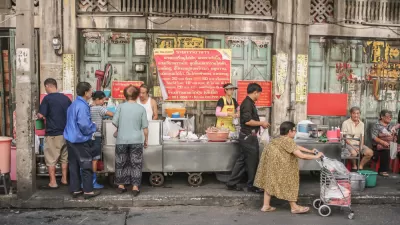Mark Vallianatos outlines the legal history and vehemently supports Los Angeles' estimated 10,000 street vendors selling everything from fruits to frozen treats.
In a recent The Los Angeles Times op-ed, Occidental College instructor and policy director of the Urban and Environmental Policy program Mark Vallianatos discusses the need for the city of Los Angeles to adopt a permit system allowing vendors to sell goods in sidewalks and parks. Indeed, Los Angeles is full of diverse cultures, each with their own unique dish and street food. However, according to Vallianatos, Los Angeles "is also the only one of the nation's 10 largest cities to completely outlaw sidewalk vending. At a time when the city is finally trying to develop a more vibrant urban core and make its streets more friendly to pedestrians and cyclists, the ban needs to be lifted."
Indeed, this lack of citywide permitting system is detrimental to the city, as it "deprives the city of tax revenue and licensing fees. And it potentially puts the public at risk, because vendors selling food on the black market have little incentive to familiarize themselves with and adhere to health codes."
Despite the city cracking down in 1980 on street vending, and then establishing certain zones in 1994, Vallianatos argues that "[i]t's time to create a citywide permit system to allow vendors to sell on sidewalks and in parks, with rules to allow pedestrian passage, to encourage safe and nutritious food and to collect sales taxes to help city finances. The city has considered enacting such a law a number of times but has not done so. And currently, the City Council is considering cracking down harder on vendors in public parks."
FULL STORY: Legalize L.A. street vendors

Study: Maui’s Plan to Convert Vacation Rentals to Long-Term Housing Could Cause Nearly $1 Billion Economic Loss
The plan would reduce visitor accommodation by 25,% resulting in 1,900 jobs lost.

North Texas Transit Leaders Tout Benefits of TOD for Growing Region
At a summit focused on transit-oriented development, policymakers discussed how North Texas’ expanded light rail system can serve as a tool for economic growth.

Why Should We Subsidize Public Transportation?
Many public transit agencies face financial stress due to rising costs, declining fare revenue, and declining subsidies. Transit advocates must provide a strong business case for increasing public transit funding.

How Community Science Connects People, Parks, and Biodiversity
Community science engages people of all backgrounds in documenting local biodiversity, strengthening connections to nature, and contributing to global efforts like the City Nature Challenge to build a more inclusive and resilient future.

Alabama: Trump Terminates Settlements for Black Communities Harmed By Raw Sewage
Trump deemed the landmark civil rights agreement “illegal DEI and environmental justice policy.”

Dear Tesla Driver: “It’s not You, It’s Him.”
Amidst a booming bumper sticker industry, one writer offers solace to those asking, “Does this car make me look fascist?”
Urban Design for Planners 1: Software Tools
This six-course series explores essential urban design concepts using open source software and equips planners with the tools they need to participate fully in the urban design process.
Planning for Universal Design
Learn the tools for implementing Universal Design in planning regulations.
City of Santa Clarita
Ascent Environmental
Institute for Housing and Urban Development Studies (IHS)
City of Grandview
Harvard GSD Executive Education
Toledo-Lucas County Plan Commissions
Salt Lake City
NYU Wagner Graduate School of Public Service



























